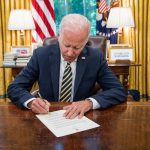The dynamic and controversial former president, Donald Trump, has once again taken the spotlight with his refusal to sign the Republican National Committee’s pledge form. Trump, who is currently the leading contender for the Republican nomination, expressed his hesitation in supporting the eventual nominee and participating in a moderated debate stage set for August 23rd. In a characteristic display of candor, Trump stated to Newsmax anchor Eric Bolling that he wouldn’t sign the pledge if there were individuals on it whom he wouldn’t endorse.
This bold move by Trump indicates his independent and unconventional style, as he continues to defy the expectations of the political establishment. It’s clear that he values personal convictions over party loyalty and is unafraid to voice his opinions. However, Governor Ron DeSantis of Florida took a different approach and signed the form, demonstrating his commitment to party unity.
WE ARE SO BACK https://t.co/9eMcDcdRoP pic.twitter.com/H9skVihmuS
— johnny maga (@_johnnymaga) August 10, 2023
This is not the first time Trump has raised doubts about the loyalty pledge in a presidential race. In the 2016 Republican primary, he eventually signed the pledge but later retracted it, citing reservations about endorsing another candidate. He even empathized with his rival, Ted Cruz, stating that he didn’t require Cruz’s support and understood if Cruz felt the same way. This shows Trump’s willingness to challenge traditional political norms and put his personal convictions above party obligations.
Trump’s refusal to sign the pledge and his strong showing in early poll numbers highlight his dominant position as the clear favorite for the 2024 Republican nomination. Pollster and political pundit Richard Baris asserts that a candidate named Donald Trump or espousing Trumpism is crucial for the party’s chances in a presidential election. Baris argues that if the Republicans distance themselves from Trump or are perceived to have opposed him, it could lead to their downfall, particularly in critical Rust Belt states.
Baris has been monitoring the shifting political landscape and stressed that for the other Republican primary candidates, the challenge now lies in swaying the majority of voters who have already decided to support Trump. He points out that previous nominees who had more than 60 endorsements from national and elected offices, as well as polling above 50%, have never lost the nomination in recent history. These statistics validate Trump’s position as the front-runner and underscore the difficulty that other candidates will face in convincing voters to change their minds.
In conclusion, Donald Trump’s refusal to sign the Republican National Committee’s pledge form is yet another testament to his unconventional style and commitment to his personal convictions. While other candidates, like Governor Ron DeSantis, have chosen party unity, Trump continues to defy expectations and challenge the traditional norms of politics. As the favored candidate for the 2024 Republican nomination, Trump’s strong showing in polls and the insights shared by Richard Baris suggest that the party’s success in the presidential election hinges on embracing the Trump brand and appealing to the desires of his fervent supporters.




